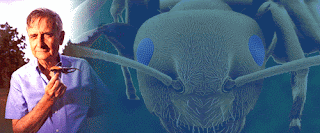Our ultimate strength

Manifest Ecology
by Edward O. Wilson
The Atlantic Monthly
November 2007
The central issue for America is sustainable development. Somehow we, and other countries, have to find a way to continue raising the quality of life without wrecking the planet.
Let’s not kid ourselves that the United States is blessed by God. Our mostly European forebears were not given this land as a gift. They conquered it, and in the process they swept aside one race and enslaved another. They took possession of the world’s richest remaining store of natural resources and set out to use it up as fast as possible. We inherited from them, and still possess, a rich and bountiful country. Although we’re halfway down the barrel of nonrenewable resources, we have enough time remaining to learn the prudence necessary for sustainable development.
The problem, simply put, is this: Long-term thinking is for the most part alien to the American mind. We have to change that. To look far forward and to acquire enough accurate vision requires better self-understanding. That in turn will depend on a grasp of history—not just of the latest tick of the geological clock that transpired during the republic’s existence, but of deep history, across the hundreds of millennia when genetic human nature evolved. Our basic qualities may seem a crazy jumble of tribalism, piety, ambition, fear, envy, exaltation, and spirituality, but they make sense in light of humanity’s deep history. They are our essence, and now, unfortunately, a few of them also present the greatest risk to the security of civilization.
Conservation and environmentalism are not hobbies; they are a survival practice. America invented conservation; we launched the environmental movement. Now we need a stronger ethic, one woven in more effective ways from science and poetry. The foundation of it will be the recognition that humanity was born within the biosphere, and that we are a biological species in a biological world. Like the other species teeming around us, we are exquisitely adapted to this biosphere and to no other—in anatomy, physiology, life cycle, mind, and, perhaps in us alone, spirit.
An allegiance to our biological heritage will be our ultimate strength. If we ignore that reality and continue to degrade the world that gave us birth by extinguishing natural ecosystems and species, we will permanently harm ourselves. By cutting away our own roots, we risk losing the dream of sustainable development.

0 Comments:
Post a Comment
<< Home